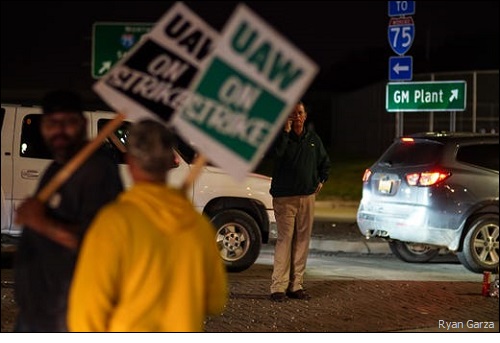
|
|

|
|
| April 26, 2024 |
|
For every GM job, up to 7 other jobs are generated. Here's how a strike affects the economy 
DETROIT - The United Automobile Workers on Sunday morning called a nationwide strike against General Motors, set to start at midnight.
It's the first national UAW strike since 2007, coming against the backdrop of a federal corruption investigation that has implicated union President Gary Jones and his predecessor, Dennis Williams. The action does not include Ford and Fiat Chrysler Automobiles, whose UAW contracts were extended while the union tries to negotiate a deal with GM that would be template for talks with the other two companies. The union let the GM contract expire at midnight Saturday, but told autoworkers with Sunday shifts to report. The union represents about 46,000 GM autoworkers at 55 facilities in the United States. A prolonged strike against GM could be painful for both sides, said Kristin Dziczek, vice president of industry, labor and economics at the Center for Automotive Research in Ann Arbor. Shutting down North American production costs GM about $400 million a day, said Dziczek. It’s also a big sacrifice for UAW workers, who get only $250 a week in strike wages, she noted. The union had $721 million in its strike fund in 2018 and temporarily increased dues in March this year to boost it to $850 million. If the General Motors strike lasts more than a few days, it could impact far more than the carmaker and the thousands of autoworkers who are walking the picket line. “It could be a surprisingly significant impact,’’ says Harley Shaiken, a professor in U.C. Berkeley’s graduate school of education who specializes in the study of labor. Striking workers may hold onto their reduced pay a little tighter, meaning that local businesses, from the dry cleaner to the movie theater, could see their profits dip. "If it turns into a more prolonged strike, which may well happen, well then you're going to have tens of thousands of workers with less ... probably being a lot more careful about what they purchase,'' says Erik Gordon, a professor at the University of Michigan's Ross School of Business who closely follows the auto industry. For every job at GM’s eleven U.S. auto assembly plants, it's estimated six or seven additional jobs are generated or connected to the facility, from people who work for outside suppliers, to employees at local restaurants where autoworkers eat, Shaiken says. “If you have 4,000 in the plant, you could have 28,000 outside of the plant’’ whose jobs are linked, he says. “That certainly has a regional impact," he adds, noting, "If the strike goes on probably past two weeks, it could be damaging.’’ Gordon likened the constellation of businesses revolving around the auto industry to a "spider web.'' While assembly plants use some components produced by their own companies, most parts, such as the seats and dashboards, are made by other businesses. "If the strike is more prolonged,'' Gordon says, "it’s going to ripple out through this spider web of all of these other companies.’' Auto manufacturing creates 9.9 million jobs in the U.S., equal to slightly more than 5% of private-sector positions, according to the Alliance of Automobile Manufacturers. The industry has historically been responsible for 3 to 3.5% of the nation’s GDP. Car dealers, a key part of the auto ecosystem, may be OK in the short run, but they could struggle if their supply of larger vehicles that are the industry's top sellers starts to shrink. "When you drive by a car dealer, you see a huge number of cars sitting there in the display lot, so they won't be hit right away,'' Gordon says. But "as soon as they start running out of SUVs and pick up trucks, they're in trouble.'' Smaller communities, where car dealerships are often one of the biggest businesses, would bear the brunt of a sales slump. "Small towns would be hurt a lot more than big cities that have other industries employing people,’’ he says. And if the strike winds on for more than a few weeks, tax revenue could also take a dip. “It will affect sales tax revenue if people are buying less things,'' says Gordon. "When you don't go to restaurants, when you hold off buying ... a new refrigerator, the decrease in sales tax revenue really impacts cities and states who can't really afford to take the blow.'' (Source: USA Today) Story Date: September 17, 2019
|